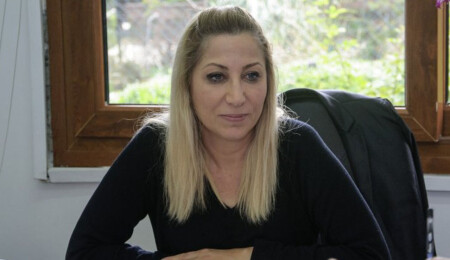Desertification Silently Advances in Cyprus

Speaking to Kıbrıs Postası on the occasion of the “World Day to Combat Desertification and Drought,” Director of the Near East University Environmental Research Centre Prof. Dr. Şerife Gündüz warned that desertification in Cyprus is advancing silently and relentlessly. “Those who ignore science cannot see the future,” she said, underlining the growing urgency of the environmental crisis facing the island.

Prof. Dr. Gündüz emphasized that while June 17 is globally marked as the World Day to Combat Desertification and Drought, “this date should not just be a calendar note for Cyprus, but a dire warning of an escalating environmental crisis.”
She noted that the effects of the global climate crisis on the Mediterranean are no longer limited to scientific reports but are now visible in everyday life. “The island of Cyprus is increasingly grappling with a drying landscape, shrinking water resources, declining agricultural productivity, and more frequent heatwaves,” Gündüz said.
“The Data Speaks: The Island Is Warming, Soil Is Depleting”
Meteorological data from the past 50 years shows that average temperatures in Cyprus have risen by approximately 1°C while rainfall has steadily declined. “This trend poses not only ecological threats but also serious economic and social risks,” she explained. “Crop yields in traditional farming regions are falling, underground water reserves are rapidly depleting, and problems such as soil salinization are becoming widespread.”
Gündüz added that May 2025 was recorded as the second hottest May on record, just behind May 2024. According to updated data from the U.S. National Weather Service, the current ENSO (El Niño–Southern Oscillation) cycle is in a neutral phase—meaning neither El Niño nor La Niña conditions are present in the Pacific Ocean.
“Despite the neutral ENSO phase, persistently high temperatures suggest that the climate crisis is now being driven by permanent, systemic global warming, not just fluctuations in ocean currents,” she said.
“Local Species and Biodiversity Also Under Threat”
Gündüz warned that Cyprus’s unique plant life and endemic species are under increasing pressure due to prolonged drought. “In rural areas, habitats of endemic species may become uninhabitable in the future, according to climate models. Drying riverbeds, depleted water springs, and escalating soil erosion are accelerating this process,” she said.
“Hope Begins in the Soil”
Despite the grim picture, Gündüz insisted that solutions are within reach. “We must restore our respect for the soil, reclaim traditional ecological wisdom, and implement nature-based solutions,” she said, outlining the following action steps:
-
Establishing local species gardens to promote drought-resistant plants
-
Enriching soil through composting and advanced recycling systems
-
Implementing rainwater harvesting and efficient water use practices
-
Diversifying agriculture and adopting shaded cultivation models
-
Supporting rural development and traditional knowledge systems
“Desertification is not just an environmental issue—it directly affects food security, rural poverty, migration, and social stability,” she stressed.
“We Live on an Island with Over 50% Desertification Risk”
Prof. Dr. Gündüz concluded with a stark warning: “We live on an island where over 50% of the land faces a risk of desertification. Scientific projections clearly show that this risk will only grow in the coming years. Yet despite all the data, the threat of desertification continues to be ignored. Current policies are shaped not by long-term solutions but by short-term, fragmented decisions aimed at quick fixes.”


Comments
Attention!
Sending all kinds of financial, legal, criminal, administrative responsibility content arising from illegal, threatening, disturbing, insulting and abusive, humiliating, humiliating, vulgar, obscene, immoral, damaging personal rights or similar content. It belongs to the Member / Members.